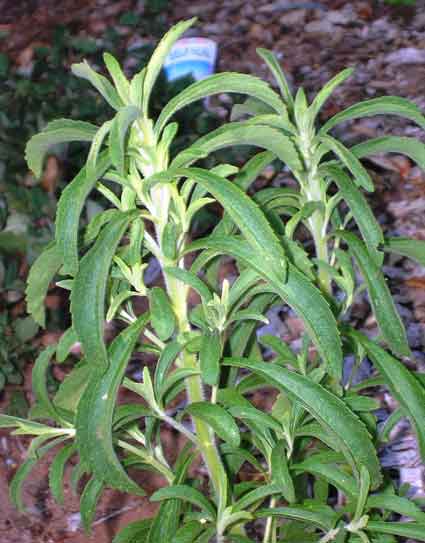
Stevia / Stevia rebaudiana

Compositae / Asteraceae
Stevia
rebaudiana
Stevia, sweet Herb
sweetener, hypoglycemic, hypotensive (lowers blood pressure), cardiotonic (tones, balances, strengthens the heart), antimicrobial, antibacterial, anticandidal, antifungal, antiviral, diuretic, vasodilator .
The leaf
Glycosides , Stevioside , Rebaudioside A ,Rebaudioside C , Rebaudioside D , Rebaudioside E , Dulcoside A , Steviolbioside .
Brazilian research group demonstrated that water extracts of stevia leaves had a hypoglycemic effect and increased glucose tolerance in humans, reporting that it "significantly decreased plasma glucose levels during the test and after overnight fasting in all volunteers." In another human study, blood sugar was reduced by 35% 6-8 hours after oral ingestion of a hot water extract of the leaf. It is a natural sweetener , and contains high levels of Chromium which works with insulin in assisting cells to take in glucose and release energy. When Chromium is lacking, the effectiveness of insulin is lessened and impaired tolerance to glucose . As a sugar substitute , stevia's taste has a slower onset and longer duration than that of sugar, although some of its extracts may have a bitter or licorice like aftertaste at high concentrations. Stevia contains compounds called steviols which can range in sweetness from 40 - 250 times sweeter than sugar. In addition to its incredible sweetness, Stevia leaf and extracts have several traditional medicinal and therapeutic benefits. While many of the therapeutic applications of Stevia are anecdotal, one must consider that it has spanned several generations of use with the Indian tribes of South America for digestive aids, hypertension, anti-microbial effects, oral tonic for tooth decay, skin care and yeast infections. The native Paraguayans and Brazilians attest to a Stevia tea concoction prepared from leaves, stems and flowers by boiling the leaves in water and then adding the thick syrup solution to a variety of drinks to aid digestion, stimulate mental alertness, regulate blood pressure as well as having a therapeutic effect upon the liver, pancreas and spleen. Though non-toxic, Stevia plants have been found to have insect repelling tendencies making it an ideal addition to organic gardeners. Stevia is a perenial annual plant. This means it dies off each year and then regrows in the next season. Well mine does anyway. Research has shown that Stevia also kills Lyme Disease . See the link in the notes section. Copy and paste it into your browser
None Known
http://greenmedinfo.com/blog/stevia-kills-lyme-disease-pathogen-better-antibiotics-preclinical-study
https://www.theherbalist.com.au/herb_gallery/stevia